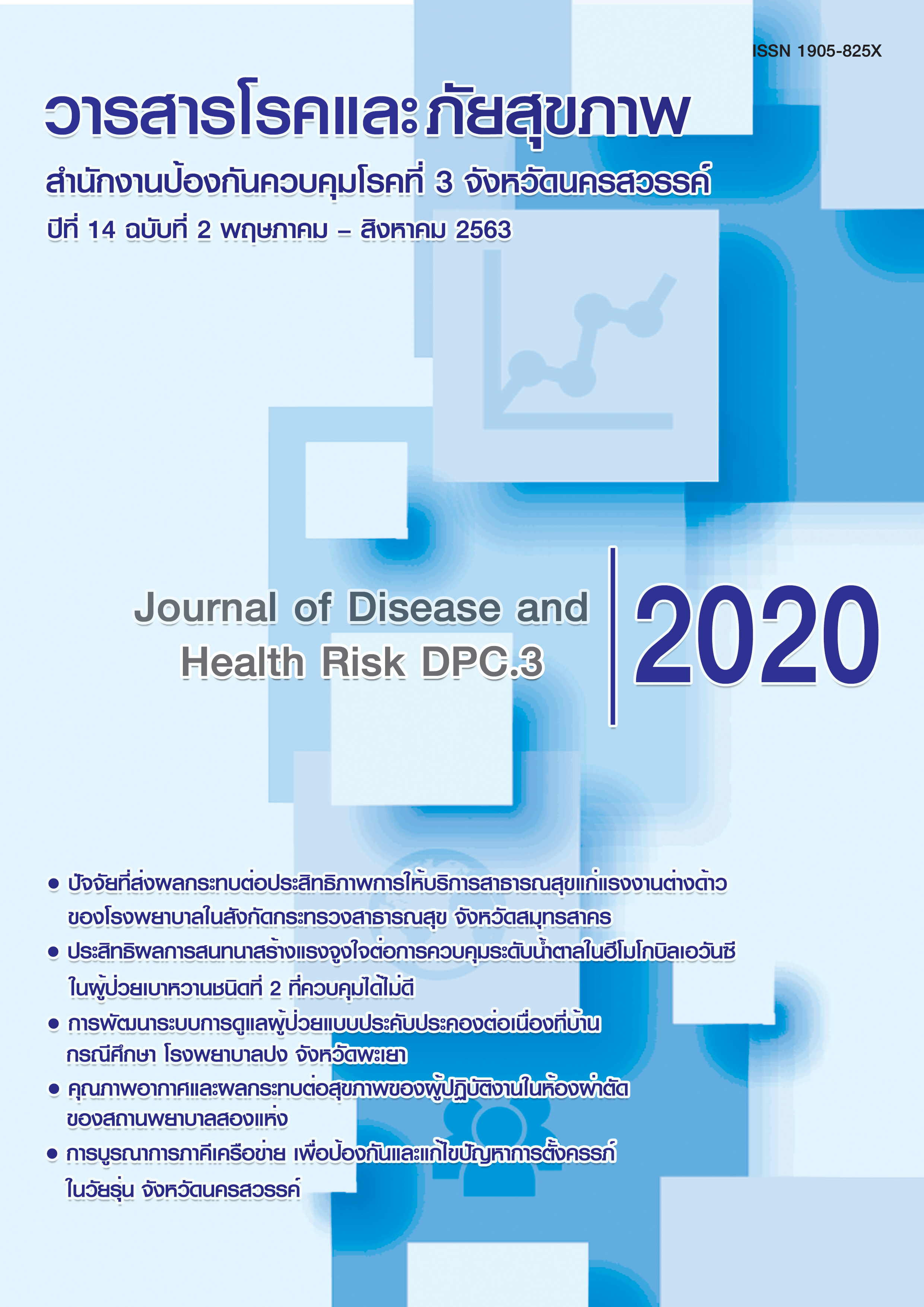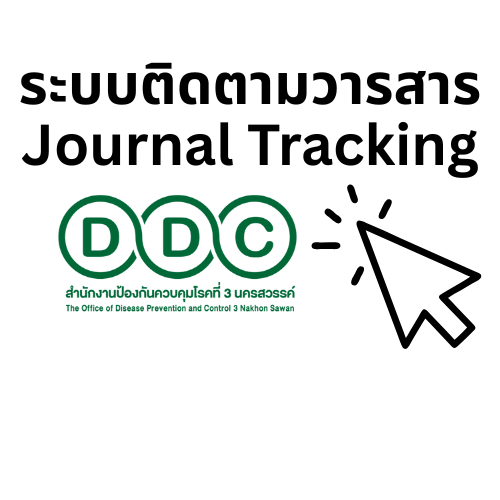The effectiveness of motivational interviewing per Hemoglobin A1C control level in poor control type 2 diabetes mellitus patients
Keywords:
Motivational Interviewing, Hemoglobin A1C control level, type 2 diabetes mellitus patientsAbstract
This study was a quasi-experimental research with repeated measurement groups. The objective was compare glucose control in HbA1c of patients before and after receiving the motivation interviewing program, developed from short consultation to strengthen motivation that 4 times per 4 months, 5-10 minutes each time. This program have 3 steps: 1)engagement 2)fight out and strengthen and 3)advice with menu. The population were patients receiving diagnosis is a type 2 diabetes and has a glucose test in HbA1c of the outpatient department in 70 hospitals under the Ministry of Public Health and had selected to 253 samples who voluntary. Performed during November 2015-2016. It was found that 31.2 % were aged 60–69 years. After the end of the sixth month found that HbA1c sugar dropped to 180 people (71.1 %), decreasingly changed the control level 101 people (39.9 %), and the mean glucose levels in HbA1c between before and after the second follow - up were significantly different at .05 level. Consistent with many researches that use motivational interview to drive internal motivation leading to behavior modification. Should bring this program to training for nurses in the diabetes clinic department to complete 100% to help control the glucose level of patients better.
References
International Diabetes Federation.IDF Diabetes Atlas. [Internet]. Brussels Belgium: International Diabetes Federation; 2017 [cited 2018 May 15]. Available from: www.diabetes-atlas.org/.
กรมควบคุมโรค, สำนักโรคไม่ติดต่อ. รํายงํานประจำปี 2560. กรุงเทพฯ: อักษรกรําฟฟิคแอนด์ดีไซน์; 2560.
American diabetes association. Standards of medical care in diabetes-2018 abridged for primary care providers. Diabetes care [Internet]. 2018 Jan [cited 2018 May 15]. 41(Suppl.1); S1-S159. Available from: http://clinical.diabetesjournals.org/content/36/1/144. International diabetes federation. IDF clinical practice recommendations for managing type 2 diabetes in pri-mary care. Brussels, Belgium: International diabetes federation, 2017.
สม ําคมโรคเบําหว ํานแห่งประเทศไทย. แนวทํางเวชปฏิบัติสำหรับโรคเบําหวําน 2560. กรุงเทพฯ: ร่วมเย็นมีเดีย, 2560.
American diabetes association. Standards of medical care in diabetes-2017. Diabetes care. 2017; 40(Suppl 1): S25-S32. Available from: http://care.diabetesjour-nals.org/content/diacare/suppl/2016/12/15/40.Supplement_1.DC1/DC_40_S1_final.pdf
Abughosh S, Wang X, Serna O, Esse T, Mann A, Masi-lamani S, et al. A motivational interviewing intervention by pharmacy students to improve medication adherence. J Manag Care Spec Pharm. 2017; 23(5): 549-560. doi: 10.18553/jmcp.2017.23.5.549
do Valle Nascimento TM, Resnicow K, Nery M, Brentani A, Kaselitz E, Agrawal P, et al. A pilot study of a community health agent-led type 2 diabetes self-management program using motivational interview-ing-based approaches in a public primary care center in São Paulo, Brazil. BMC Health Serv Res. 2017; 17(1):32. doi: 10.1186/s12913-016-1968-3
Veliyathumalil JB. Effectiveness of motivational in-terviewing-based telephone follow-up in diabetes man-agement. 2017 [cited 2018 May 23]. Available from: https://sigma.nursingrepository.org/bitstream/han-dle/10755/623556/Veliyathumalil_J_DNP_Capstone.pdf?sequence=6&isAllowed=y
Li M, Li T, Shi B-Y, Gao C-X. Impact of motiva-tional interviewing on the quality of life and its related factors in type 2 diabetes mellitus patients with poor long-term glycemic control. Int J Nurs Sci. 2014; 1(3): 250-4
Song D, Xu T-Z, Sun Q-H. Effect of motivational interviewing on self-management in patients with type 2 diabetes mellitus: A meta-analysis. Int J Nurs Sci. 2014;1(3): 291-7
Welch G, Zagarins SE, Feinberg RG, Garb JL. Moti-vational interviewing delivered by diabetes educator: does it prove blood glucose control among poorly controlled type2 diabetes patients?. Diabetes Res Clin Pract. 2011; 91(1): 54-60
Miller ST, Oates VJ, Brooks MA, Shintani A, Geb-retsadik T, Jenkins DM. Preliminary efficacy of group medical nutrition therapy american women with type 2 diabetes: a pilot study. J Obes. 2014 Aug. doi: 10.1155/2014/345941. Available from https://www.ncbi.nlm.nih.gov/pmc/articles/PMC4163289/.
Gabblay RA, Anel-Tiangco RM, Dellasega C, Mauger DT. Adelman A, Van Horn DH. Diabetes nurse case man-agement and motivational interviewing for change (DY-NAMIC); results of a 2 year randomized controlled prag-matic trial. J Diabetes. 2013; 5(3): 349-57
Rubak S, Sandbaek A, Lauritzen T, Borch-Johnsen K, Christensen B.Effect of motivational inteviewing on qual-ity of care measures in screen detect type2 diabetes pa-tients; a one year follow-up of an rct, addition Denmark. Scand J Prim Health Care. 2011; 29(2): 92-8
Miller WR, Rollnick S. Motivational interviewing: Helping people change. (3rd edition). New York: Guilford press, 2013.
เทอดศักด์ เดชคง, รัฒดํา ครประสี. กํารให้คำปรึกษําแบบสร้ํางแรงจูงใจเพื่อป้ องกันและแก้ไขปัญหําโรคไม่ติดต่อเรื่อรัง. กรุงเทพฯ: บียอนด์พับลิซซิ่ง, 2557.
Soderlund PD. Effectiveness of motivational inter-viewing for improving physical activity self-management for adults with type 2 diabetes: A review. Chronic Illness. 2018; 14(1): 54–68 doi: 10.1177/1742395317699449
Li L, Chen Q, Yan J, Liang W, Wong WCW. Ef-fectiveness of motivational interviewing on improving care for patients with type 2 diabetes in China: A random-ized controlled trial. BMC Health Services Research. 2020; 20:57 doi.org/10.1186/s12913-019-4776-8
Celano CM, Gianangelo TA, Millstein RA, Chung WJ, Wexler DJ, Park ER, et al. A positive psychology–motivational interviewing intervention for patients with type 2 diabetes: Proof-of-concept trial. Int J Psychiatry Med. 2019; 54(2):97-114. doi: 10.1177/0091217418791448
Gallé F, Di Onofrio V, Miele A, Belfiore P,Liguori G. Effects of a community-based exercise and motiva-tional intervention on physical fitness of subjects with type 2 diabetes.Eur J Public Health. 2019 ;29(2):281-6. doi: 10.1093/eurpub/cky140
Downloads
Published
How to Cite
Issue
Section
License
Copyright (c) 2020 Journal of Disease and Health Risk DPC.3

This work is licensed under a Creative Commons Attribution-NonCommercial-NoDerivatives 4.0 International License.
Copyright notice
Article published in the Journal of Disease and Health Risk DPC.3 Nakhon Sawan. It is considered a work of academic research and analysis as well as the personal opinion of the author. It is not the opinion of the Office of Disease Prevention and Control 3, Nakhon Sawan. Or the editorial team in any way Authors are responsible for their articles.
Privacy Policy
Name, address and e-mail address specified in the Journal of Disease and Health Risk DPC.3 Nakhon Sawan. It is used for identification purposes of the journal. And will not be used for any other purpose. Or to another person.









